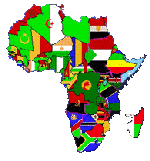Sometime on Tuesday, the US President, Barack Obama, was interviewed on a wide range of topics by ABC's George Stephanopoulos. I saw a report of the interview on a news/blog site,
God Reports, and then read the
transcript from ABC News. The thing that caught my attention was at the very end of the interview, almost like an afterthought. Stephanopoulos asked President Obama some concerns that had been expressed about the possibility of an American being selected as the new Pope:
...a lot of eyes on Rome as the cardinals prepare to pick a new pope. And for the first time, some American cardinals on the list. Well, what I wanted to ask you about, there seems to be some concern, and you hear this a lot, that– among Catholics, there shouldn’t be an American pope because that pope would be too tied to the U.S. government. Kinda the mirror image of John F. Kennedy’s problem back in 1960. What do you think of that?
Frankly, I haven't kept up with Catholic news. Sure, I knew that the previous Pope had retired — that hadn't happened in something like 600 years. And, yes, I knew that the College of Cardinals were meeting to select a new Pope (that engendered a lot of teasing with some friends who are fans of an American baseball team, the St. Louis Cardinals). But, quite honestly, that does not impact my life in any way at all. No disrespect intended, it just doesn't.
President Obama gave a witty response,
I don’t know if you’ve checked lately, but the conference of Catholic bishops here in the United States don’t seem to be takin’ orders from me, but what caught my attention was President Obama's next statement:
I– my hope is– based on what I know about the Catholic Church and– the terrific work that they’ve done around the world.
And certainly in this country, and, you know– helping those who are less fortunate– is that– you have– a pope who sustains and maintains– what I consider the central message of the gospel. And that is– that we– we treat everybody– as children of God and that– we love them– the way Jesus Christ taught us to love ‘em.
Look at that again,
...the central message of the gospel ... is that we treat everybody as children of God and that we love them the way Jesus Christ taught us to love 'em. That got me thinking, "I don't think that is the gospel message, but how would I define
the gospel?" [Disclaimer: This is neither a political statement, nor criticism of President Obama — his statement just got me thinking.] So, I worked on it for a bit. I wasn't starting from scratch; I had heard other people define
gospel, but I had never tried to do that for myself. If you want a single New Testament passage that gives a definition, a good place to start is Colossians 1:13-23. But, I wanted to see how I would define
gospel. This is what I came up with:
We were once alienated from God and were enemies of God because of our sin, our evil behaviour (Col. 1:21). Jesus came to earth as a human descendant of Israel's King David (Rom. 1:3). However, Jesus was not just a good man. Jesus is God's Son (Rom. 1:3), he is the image of the invisible God (Col. 1:15), he is one with God the Father (John 10:30), he is fully God (Col. 1:19). He was powerfully proved to be God's Son by his resurrection from the dead (Rom. 1:4). He reconciled us with God through his death on the cross (Col. 1:22), forgave our sins (Col 1:14), and made us citizens of his Kingdom (Col. 1:13). This reconciliation to God becomes reality when we believe this good news (Eph. 1:13) by faith (Eph 2:8). The guarantee, the seal, of our reconciliation and our ultimate salvation is the presence of God's Spirit in us (Eph. 1:13). Our good works (love, justice, service, etc.) are not the cause of our salvation, but are the result of our salvation by faith (Eph. 2:10) and the evidence that God's Spirit is in us (Gal. 5:22-26).
- How would you define gospel?
For the Kingdom,
Bob A
